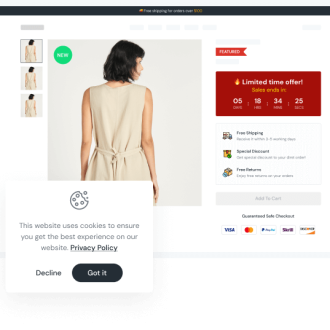You can start your online store on any of the many different platforms available. It can be difficult to choose the best one for what you’re looking for. The list of ecommerce platforms in this blog post could help you find the most suitable one for you!
Shopify - Best Ecommerce Platforms For Dropshipping
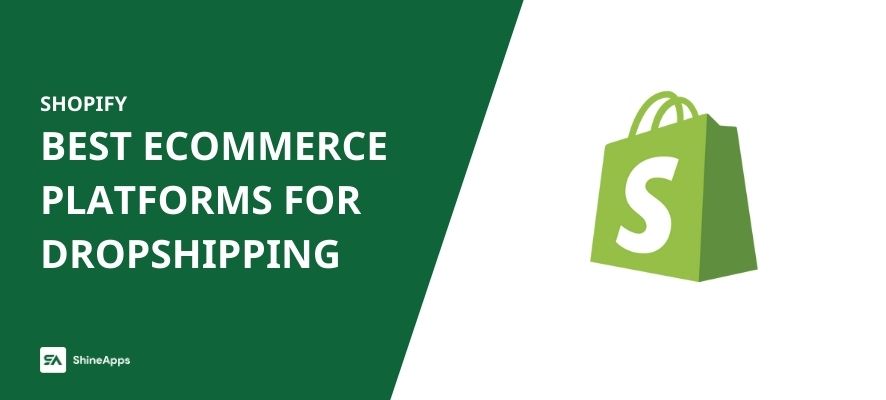
If you are planning to start your business with dropshipping without coding skills, Shopify is one of the best e-commerce platforms for you. It offers itself a variety of dropshipping methods that enable simple online sales without an inventory.
Refer to Shopify Dropshipping for more details.
By the time the three-day trial period is through, you will be able to pay for your plan due to its detailed onboarding process.
Without any coding skills or design experience, Shopify is a user-friendly platform where you can create a live Shopify store that’s optimized for search in just a few hours.
The $29 per month plan is usually ideal for most sellers to meet their store’s demands. Up to two staff accounts, shipping savings, POS accessibility (via Shopify POS Lite, which is suitable for small events), and abandoned cart recovery are all included.
Pros & Cons of Shopify
Pros:
- User-friendly site setup
- Numerous app integrations
- 24/7 customer service
- Abandoned cart recovery
- Shipping discounts of up to 88%
- Sell online and in-person
- Omnichannel selling
- Offers POS functionality
Cons:
- Limited customization freedom
- Higher-tier plans and pricey
- A limited number of free themes
- Transaction fees are charged when not using Shopify Payments
- Limited time for free time
- The seller must purchase a custom domain or import one
Products You Can Sell
Shopify is one of the most common e-commerce platforms and supports a wide range of products and services. Some of the products and services you can sell are:
- Physical products
- Digital products
- Subscription boxes
- Online booking services
- Gift cards
- Memberships
- Live plants and flowers
- Online courses and training
- Tickets to events, attractions, and tours
Shopify prohibits selling some products, for example, prescription medicines, live animals, explosives, cigarettes, sexually explicit products, warranties and service plans, etc.
Who Should Use Shopify?
Small businesses that are interested in creating a real online store rather than just a website with basic e-commerce features should use Shopify.
With Shopify, you may start selling both real and digital goods in your store, as well as online marketplaces, social media platforms, pop-up shops, and physical stores. As your business expands, Shopify will scale wonderfully.
Squarespace - Best Overall E-commerce Platform
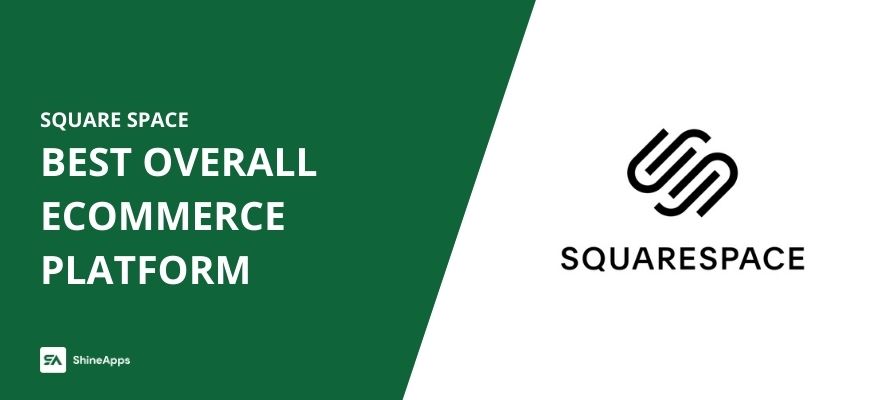
Squarespace is an all-in-one website builder best known for its stunning designs. The popular platform makes it simple to create an online identity, manage a website, and open an online store.
Squarespace offers an outstanding bundle for both individual users and new business owners due to its inexpensive costs and user-friendly layout.
Pros & Cons of Squarespace
Pros:
- Create a professional-calibre website with no web design or technical skills
- Unlimited storage and bandwidth
- Fully integrated e-commerce on most plans starts at $23 per month
- The free domain name and SSL certificate
- No transaction fees
- Free top-notch template
- Offers a POS
Cons:
- No free plan is available
- No phone support
- No multichannel selling
- Abandoned cart recovery does not come standard
Products You Can Sell
Squarespace is a good platform for starting a small business or blogging for beginners. If you are a freelancer or own an offline store, this platform will help boost your branding or sales.
Who Should Use Squarespace?
Squarespace can be used for both personal and business purposes.
For personal use, Squarespace helps to create beautiful websites to document and share life experiences, for example, your work, your event, etc.
Small companies, including restaurants, salons, financial services, and fitness centers, as well as solopreneurs like authors, coaches, bloggers, and artists, frequently use the Squarespace site builder. Large, expensive e-commerce sites or those with highly technical website-building skills should avoid using this.
Wix - Best for Drag-and-Drop Editor

Wix is an all-in-one website builder that enables even those without design or coding skills to quickly create beautiful websites. Wix is popular among bloggers, business owners, and owners of small businesses.
The inexpensive Wix plans are deserving of a closer look if you want to create a website without spending a lot of money. Wix provides both free and premium plans, hundreds of design templates, built search engine optimization (SEO), and an entire range of in-demand tools that help you build an effective and attractive website.
Pros & Cons of Wix
Pros:
- Easy-to-use drag-and-drop interface
- Built-in SEO
- Multiple app integrations are available
- Free all templates
- Unlimited products for sale
- Accept recurring payments.
- ADI (Artificial Design Intelligence) support
Cons:
- Storage limits
- Limited dropshipping integrations
- Visitor analytics are not available on free or combo plans
- You can’t change templates once your store is live
Who Should Use Wix?
Everything you require to launch, develop, and manage a profitable blog is included with Wix. The drag-and-drop editor makes it simple to add and format text, insert images, and create new posts. Additionally, there are built-in tools like social network integrations, email marketing, and SEO that can help you maintain your blog and expand your audience.
With its Business and eCommerce services, Wix enables you to transform your website into an online store. You may sell goods, accept payments, and manage your inventory all in one place with the help of these plans. Additionally, it includes a lot of tools that can be used to advertise your business and turn visitors into potential customers.
Square Online - Best For Omnichannel Selling
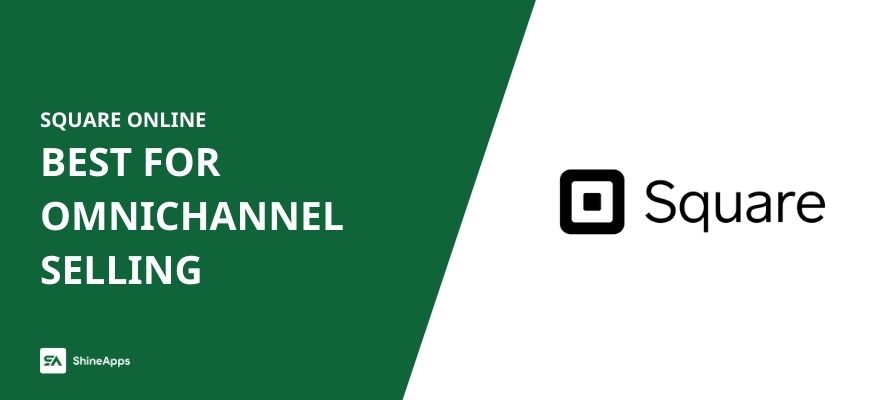
Square Online is a payment processing and point of sale (POS) platform used by many businesses. For small businesses or startups, Square offers a cheap cost structure, which is a wonderful advantage for those whose monthly revenue is variable. This POS is inexpensive and user-friendly, and it has a lot going for it.
Pros & Cons of Square Online
Pros:
- Free to start
- There are no monthly fees for the Basic Plan
- Wide range of hardware to choose from
- All plans have multichannel sales.
- Sync your Square POS on each plan
- With paid plans, customers can order using a QR code
- Discounted processing fee on its highest-tiered plan
Cons:
- No custom domains with its free plan
- Must have a paid plan for abandoned cart features
- No phone support
- Not cost-effective for high-volume transactions
- Accounts can freeze due to irregular activity
Who Should Use Square Online?
Square is the best option for you if you are just starting and unsure of how much money your business will make because it has no monthly fees and comes with a Square Reader for Magstripes. Enough to get you started immediately.
Square can be a good option if your monthly transaction volume is minimal or varies from month to month because it guarantees that you only pay processing fees on revenue. It’s one of the more flexible POS platforms because there’s no monthly subscription.
WooCommerce - Best For Versatility
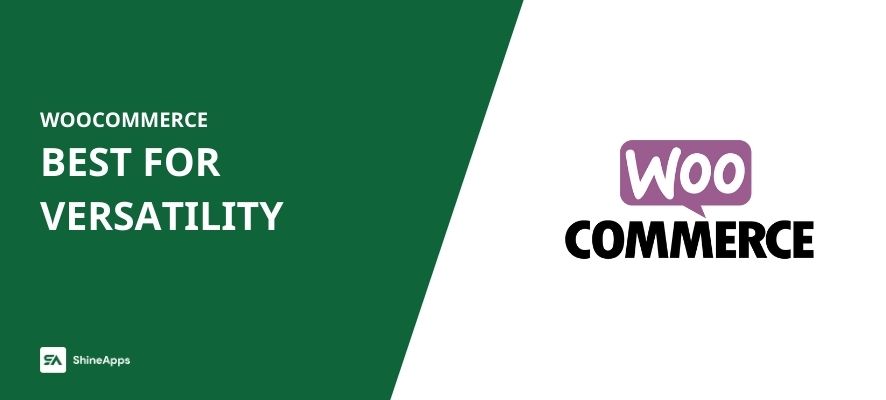
WooCommerce is a plugin that enables users to transform a WordPress website into an online store. The basic version is free, but thanks to its extensive selection of extensions, it is incredibly customizable.
For example, you can sell memberships, accept recurring payments, and accept online bookings with WooCommerce extensions. From FedEx to Royal Mail, there are many shipping options available to you. You may also set up a coupon promotion programme, accept pre-orders, sell online courses, and do many other things. Prices for extensions range from zero to about $249 for every extension.
Pros & Cons of WooCommerce
Pros:
- Free to use
- Sell products and services, accept bookings and make recurring payments
- Accept deposits
- Sell pre-orders
- Many payment gateways are available
- Tonnes of extensions are available
Cons:
- Must buy web hosting, domain, and SSL certificate separately
- WordPress involves a steep learning curve
Who Should Use WooCommerce?
If you have technical coding skills, WooCommerce is the best e-commerce solution. With WooCommerce, you can build and manage a highly customizable and versatile online store.
Ecwid - Best For Existing Sites
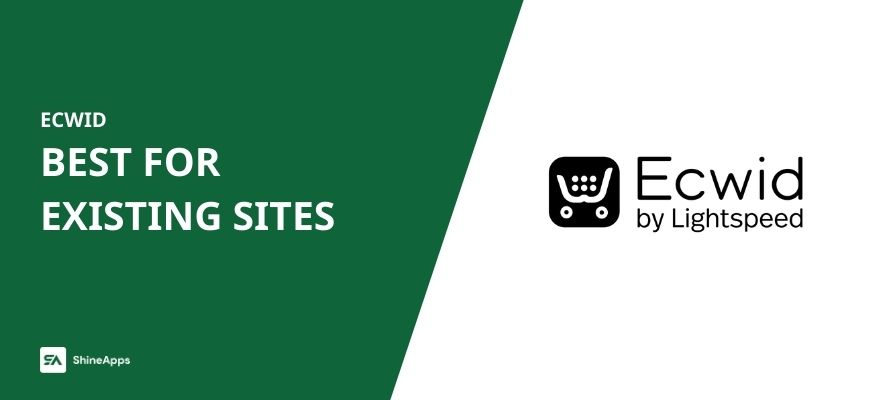
Ecwid is a good choice, with no transaction fees (aside from standard credit card processing fees) and a free plan.
What may seem to be a unique business name is only a combination that stands for “e-commerce widget.” This is how it’s titled because it’s designed for already-existing websites (like a WordPress blog). You can display your products in a fully functioning online store without having to build a new website by using HTML to add Ecwid’s code to your existing one.
The $14.08/month Venture Pack from Ecwid allows POS and multichannel selling. For $29.08 a month, its Business plan offers staff accounts, product variations, and abandoned cart emails. You may even get your own custom iOS or Android shopping app if you sign up for an annual Unlimited plan at $82.50 per month.
Pros & Cons of Ecwid
Pros:
- Offers a free plan
- Integrate with your existing site
- Create a custom iOS or Android app with the Unlimited plan
- No transaction fees
- Allows multichannel selling on paid plans
Cons:
- It offers a stand-alone site option, but it only has one page
- Product variations are not available on the Free or Venture plans.
- Cannot edit orders on Free or Venture plan
- The free plan is limited to ten products
- Designs are limited
Who Should Use Ecwid?
Ecwid is a fantastic option if you’re looking to add a highly-rated ecommerce widget to an already-existing website. Its Venture Plan, which allows up to 100 products and sells on both Facebook and Instagram, is ideal for businesses in their first year in particular. You can have up to ten products and pay no transaction costs even if you sign up for the free plan.
BigCommerce - Best For Boosting Sales
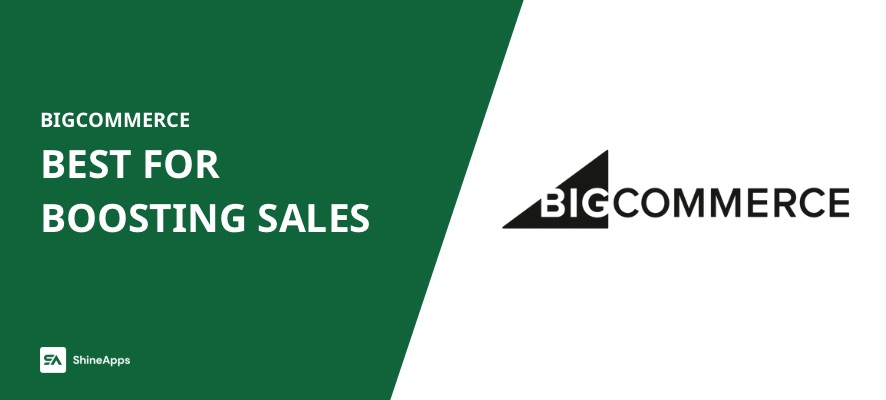
BigCommerce is built for selling online, so its plans come packed with the features retailers need to foster leads and land sales.
Plans with unlimited storage, bandwidth, and products start at $29.95 a month. It provides flexible selling with numerous currencies for overseas sales and a variety of payment options for customers, including Apple Pay, Google Pay, and Amazon Pay.
Creating an online store with BigCommerce is similar to developing one with Squarespace or Shopify in that there is little learning required. Plans, unlike Squarespace, do not come with a domain name, and not all themes are offered for free.
Pros & Cons of BigCommerce
Pros:
- Well-rounded entry-level plan
- Drag-and-drop website builder
- A large number of product options can be used
- Blogging and SEO tools
- Strong reporting functionality
- Tonnes of built-in sales and marketing tools
- User-friendly page builder
- No transaction fee
- Accept Apple Pay, Google Pay, and Amazon Pay
Cons:
- A limited number of free themes included
- Limited options to customize content without paying extra
- Plans do not include a domain name
- Plans have a cap on annual sales
Who Should Use BigCommerce?
BigCommerce is an excellent choice for small businesses and new shop owners since it offers a cheap entry-level plan that is loaded with features. If you already use a payment processor that is third-party and would like to keep using it, this is a great option.
Shift4Shop - Best Free Ecommerce Platform
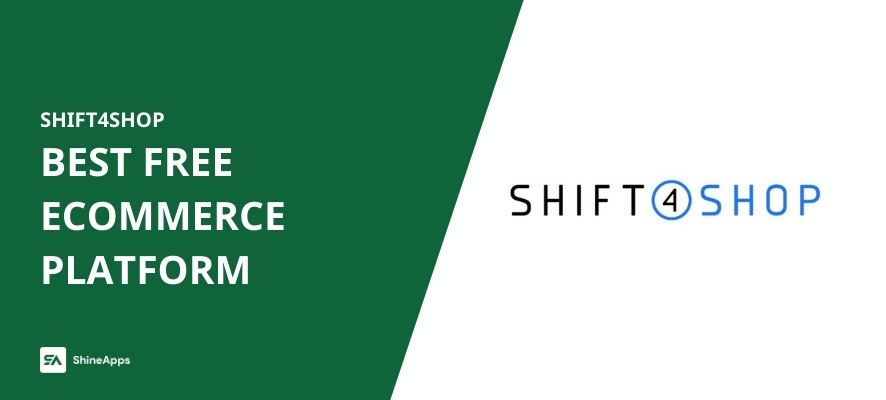
If you’re U.S. based, your Shift4Shop plan is entirely free, provided you use its credit card processor. The industry standard for credit card processing fees is 2.9% plus $0.30 for each order. The features are numerous; you can use as many staff accounts, items, variations, and digital downloads as you need.
You must register for a premium plan if you want to use your payment processor. These range in price from $29 to $229 a month; the more expensive the plan, the more staff accounts you get.
Pros & Cons of Shift4Shop
Pros:
- Offers its most extensive plan for free
- Upsell and cross-sell
- Built-in CRM
- Unlimited products
- Unlimited users and bandwidth
- Very easy to use
- Over 100 free themes
- No revenue caps
- Includes fraud protection
Cons:
- Limited customization
- Its paid plans have a sales limit of $100,000 per year
- A limited selection of apps is available
- Customization options are limited
- Not available outside of the U.S.
Who Should Use Shift4Shop?
For business owners on a tight budget who want a lot from their provider, Shift4Shop is the ideal ecommerce platform. Its free plan’s features are unstoppable, especially if you don’t care who handles your payments—just that you get paid.
Weebly - Best Value Platform
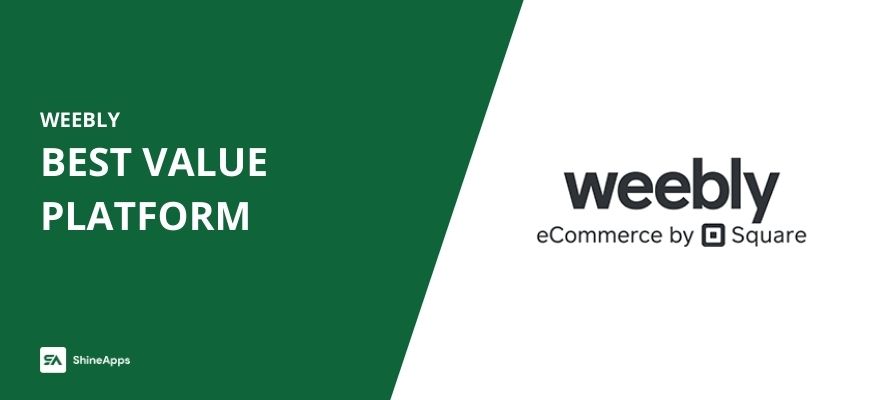
The greatest website builder, Weebly, gets recognition for being clear and easy to use. Both e-commerce platforms, Weebly and Square, are owned by the same business, however, they have different product offerings. All of its website options, like Square, are created to satisfy the requirements of online shops on a budget.
Pros & Cons of Weebly
Pros:
- Free basic plans are available
- Competitively priced plans start at $10 per month
- Unlimited storage and bandwidth
- Unlimited items
- The free domain name and SSL certificate
- Sell physical and digital goods
- Accept recurring payments
- Automatic tax and shipping calculator
Cons:
- Cannot connect a custom domain to a free plan
- Some of its themes look cheap
Who Should Use Weebly?
For small businesses that are just getting started with a website and want a low-cost and extremely simple solution for building an online store, Weebly is the best e-commerce platform.
Big Cartel - Best For Creatives

One of the cheapest platforms for setting up an online business is Big Cartel. Because it is so inexpensive, it offers free plans that, in a highly creative way, let you link your domain name and sell up to five things. Although it’s targeted at online sellers in the creative industries, it can be used by any vendor to quickly and affordably create an online store to sell products.
With Big Cartel, you may sell products on Facebook, in person, or online through your website. It provides the essential services that online businesses need, like order management and inventory tracking. It is simple to use, but it isn’t customizable. Additionally, it is not targeted at people who offer services or subscriptions online.
Pros & Cons of Big Cartel
Pros:
- The free plan allows you to connect your domain
- Very low-cost paid plans
- Order management
- Inventory tracking
- Sell online, in-store, or on Facebook
Cons:
- Limited customization capabilities
- Not geared towards selling services
- Limited template library
Who Should Use the Big Cartel?
Big Cartel is a great option for small e-commerce businesses that are looking to easily sell physical items online without a big investment of time or money.
In Conclusion
Each e-commerce platform has its advantages and disadvantages. Based on our analysis, we hope that you can find the perfect platform to start your e-commerce business.



